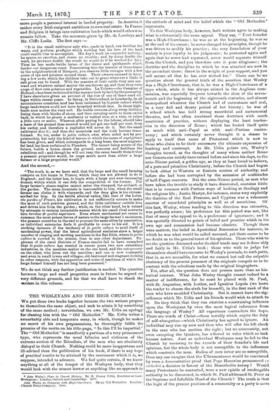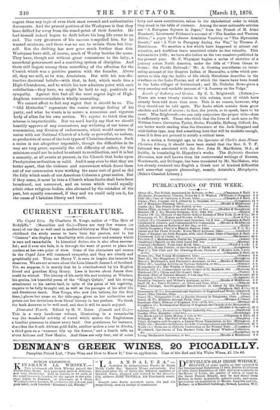THE WESLEYANS AND THE HIGH CHURCH.* WE put these two
books together because the two writers propose to themselves the same object, and seek to attain it by something of the same method ; nevertheless, we owe Mr. Urlin an apology for classing him with the " Old Methodist." Mx. Urlin writes a remarkably able and temperate essay, in which, though he makes no secret of his own prepossessions, he thoroughly fulfils the promise of the motto on his title-page, "In this I'll be impartial." The " Old Methodist "is manifestly a partizan of a very pronounced type, who represents the usual fallacies and violences of the extreme section of the Ritualists, of the men who are absolutely disloyal to their Church. Nothing could be more inopportune and ill-advised than the publication of his book, if there is any hope of practical results to be attained by the movement which it is, we suppose, intended to advance. We feel quite certain, if we know anything at all of the temper of the Wesleyan body, that they would look with the utmost horror at anything like an approach to * John Waley's Place in Church Ilittory. By R. Denny UAW, Barrister-at-Law. Rivingtons: London, Oxford. and Cambridge. 1870.
John Wesley in Company with High-Churchmen. By an Old Methodist. Loudon: Church Press Company. 1860.
the attitude of mind and the belief which the " Old Methodist' represents.
To this Wesleyan body, however, both writers agree in making what is anbstantiaUy the same appeal. They say, " Your founder was a High-Churchman ; he was so at the beginning, he was so at the end of his career ; he never changed his principles, though he was driven to modify his practice ; the very foundation of your society is your loyalty to his judgments ; he protested again and again that he never had separated, never would separate himself from the Church, and you therefore owe it your allegiance ; the doctrine and the discipline to which ho was attached are now in the ascendant there; throw in the weight of your support, and you will secure all that he has ever wished for." There can be no question about the general truth of the assertion that Wesley was a High-Churchman, that is, he was a High-Churchman of a type which, while it has always existed in the Anglican com- munion, was especially frequent towards the close of the seven- teenth and the beginning of the eighteenth centuries, and almost monopolized whatever the Church had of earnestness and zeal, in a very dull and dreary period of her history ; he was of a school which has held strong sacerdotal and sacramental theories, and has often combined these doctrines with much asceticism of practice, without displaying the least tenden- cies iu the direction of Rome ; which has busied itself quite as much with anti-Papal as with anti-Puritan contro- versy; and which certainly never thought it a shame to apply to itself that name of Protestant which is now to those who claim to be their successors the ultimate expression of loathing and contempt. As Mr. Urlin points out, Wesley's thoughts turned, as the thoughts of many whom neither Rome nor Geneva can satisfy have turned before and since his days, to the aute-Nicene period, a golden age, as they at least loved to believe, of a pure and primitive Christianity, before the Church had begun to look either to Western or Eastern centres of authority, and before she had been corrupted by the accession of multitudes of half-Pagan converts. But the ante-Nicene period, as men who have taken the trouble to study it have discovered, contains little that is in common with Puritan ways of looking at theology and the religious life ; Justin Martyr, for instance, states very explicitly the doctrine of the Real Presence, and Cyprian was a vehement asserter of sacerdotal principles as well as of asceticism. Of this fact, Wesley, whose reading in this direction was extensive, was perfectly aware; his preference for this period was not, like that of many who appeal to it, a preference of ignorance ; and it was specially directed to points of belief and practice which iu his own age and communion had become obsolete. Though' there were matters, the belief in Apostolical Succession for instance, in which he was what would be called unsound, yet there seems to be no doubt as to the general tenor of his opinions. Those who wish to see the question discussed under its chief heads may see it done ably and fairly in Mr. Urlin's book ; those who wish to judge for themselves should have recourse to Wesley's journals, to such parts, that is, as are accessible, for what we cannot but call the culpable obstinacy of the present possessor of the originals compels us to be content with the selections made by the original biographers.
Yet, after all, the question does not possess more than an his- torical interest. What John Wesley thought cannot indeed be a matter of indifference, for he must be placed with St. Paul, with St. Augustine, with Luther, and Ignatius Loyola (we leave the reader to choose the sixth for himself), in the first rank of the men who have moulded Christianity. But it cannot have the sig- nificance which Mr. Urlin and his friends would wish to attach to it. Do they think that they can exercise a constraining influence upon the Wesleyans by even the most logical inferences from the language of Wesley? All experience contradicts the hope. There are words of Christ—those notably which enjoin the duty of self-abnegation—which Christianity has agreed to ignore. An individual may riae up now and then who will offer his left cheek to the man who has smitten the right ; but no community, not even excepting the Quakers, has adhered to rules which so task human nature. Just so individual Wesleyans may be led to the Church by recurring to the records of their founder's life and opinions, but the whole body is not susceptible to the influences which constrain the man. Bodies of men never are so susceptible. Does any one imagine that the Ultramontanes would be convinced by even a demonstrative proof that Pope Honorius pronounced ex cathedra a decision in favour of the Monothelite heresy ? Would many Protestants be converted, were a new epistle of irrefragable authority to be discovered, in which St. Paul addressed St. Peter as the Supreme and Infallible Head of the Church? The truth is that the logic of the present position of a community or a party is more
cogent than any logic of even their most revered and authoritative documents. And the present position of the Wesleyans is that they have drifted far away from the stand-point of their founder. He had himself indeed begun to drift before his long life came to an end. The very greatness of his success compelled him, for he wanted ministers, and there was no one to ordain them but him- self. But the drifting has now gone much further than this. Wesleyans have still, of course, much of Wesley besides the name. They have, though not without great concessions to the laity, a sacerdotal government and a searching system of discipline. And there still lingers among them something of the affection for the Church which was a positive passion with the founder. Above all, they are still, as he was, Arminians. But with his non-dis- tinctive doctrinal beliefs—with that, in fact, which made him a High-Churchman, and to which his new admirers point with such satisfaction—they have, we might be bold to say, positively no sympathy. Against this fact all the most cogent logic of High- Anglican controversialists is wholly unavailing.
1Ve cannot affect to feel any regret that it should be so. The " Old Methodist" represents the coarse average feeling of his party, and what he wants is to secure a numerous and vigorous body of allies for his own section. We rejoice to think that the scheme is impracticable. But we need hardly say that we should heartily approve of any concessions, any widening of our terms of communion, any division of endowments, which would secure the union with our National Church of a body so powerful, so zealous, so productive of some of the best types of Christian character. Such a union is not altogether impossible, though the difficulties in its way are very great, especially the old difficulty of orders, for the ministers could not be asked to submit to reordination, and it is but a minority, at all events at present, in the Church that looks upon Presbyterian ordination as valid. And it may even be that they are better apart, that the violence and narrowness which drove them out of our communion were working the same sort of good as did the folly which made of our American Colonies a great nation. But if they come, it must be into a Church whose limits shall have been broadened, not narrowed, and on terms which would equally admit other religious bodies, also alienated by the mistakes of the past, but equally concerned, if they and we could only see it, for the cause of Christian liberty and truth.



































 Previous page
Previous page